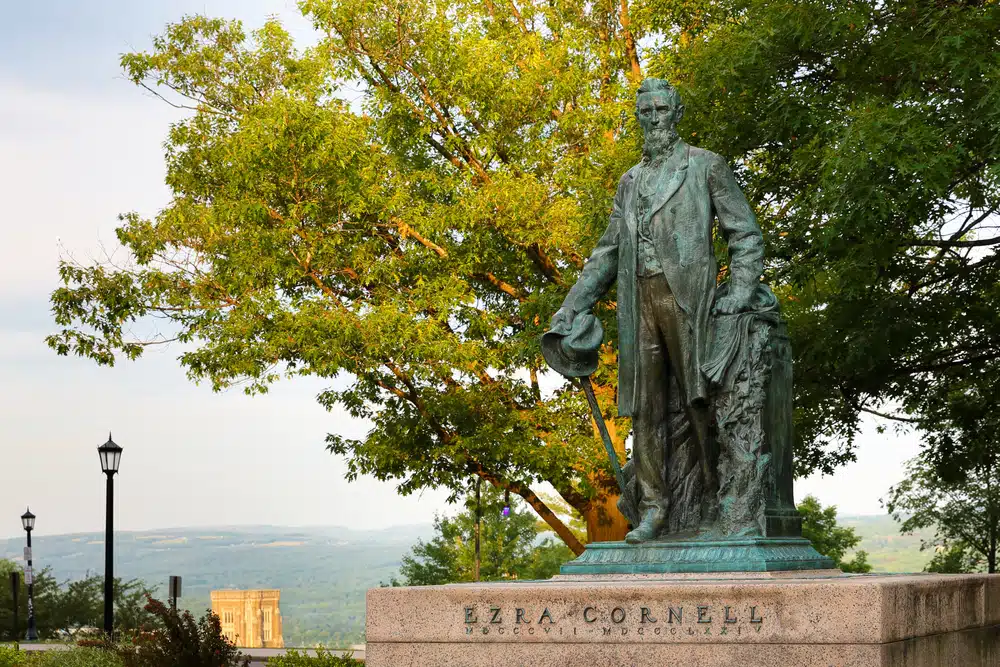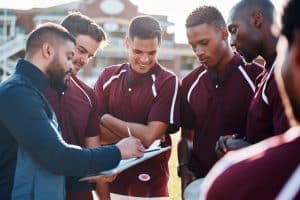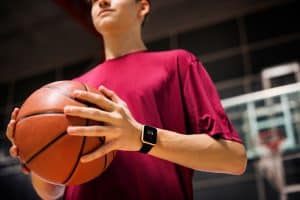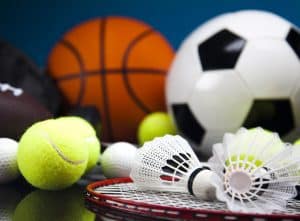Exploring Varsity Sports at Cornell University
Cornell University, an Ivy League institution in Ithaca, New York, is known for its excellent academics, diverse student body, and lively varsity sports scene.
This article explores the various facets of varsity sports at the institution, ranging from their importance, the various sports programs on offer, the athletic facilities, the process of becoming a varsity athlete, and the future of varsity sports at Cornell.
Understanding the Importance of Varsity Sports
The Role of Varsity Sports in Student Life
For many Cornell students, participating in varsity sports is a major part of their university experience. These sports provide an opportunity for students to engage in healthy competition, build teamwork and leadership skills, and form deep bonds with their fellow athletes. They become an essential part of the vibrant campus life, with matches and tournaments drawing crowds of enthusiastic spectators from the student community.
When students join varsity sports teams, they commit to honing their athletic abilities and become part of a tight-knit community. Student-athletes develop strong camaraderie and mutual support through daily practices, team meetings, and shared experiences. They learn to rely on one another, both on and off the field, fostering lifelong friendships that extend far beyond their college years.
Moreover, varsity sports provide students with valuable opportunities for personal growth and development. As they face the challenges of intense training and competition, student-athletes learn to push their limits, overcome obstacles, and develop resilience. These skills translate into other areas of their lives, such as academics and future careers, making varsity sports an integral part of their holistic education.
The Impact on Physical and Mental Health
Varsity sports not only promote physical fitness by encouraging regular exercise and healthy lifestyle habits but also have positive impacts on mental health. The structured environment of a varsity team, combined with the inherent challenges of competitive sports, helps build resilience and stress management skills among student-athletes. Regular physical activity also improves mood and boosts mental well-being, making varsity sports an essential component of a holistic health approach on campus.
Engaging in varsity sports allows students to experience the numerous physical benefits associated with regular exercise. The rigorous training and conditioning programs help improve cardiovascular health, build strength and endurance, and enhance overall physical performance. These physical improvements contribute to the athletes’ success on the field and have long-term health benefits that extend well beyond their college years.
In addition, varsity athletes often have access to university resources like trainers, sports psychologists, and health services, which can support their overall well-being and help them navigate the unique challenges posed by balancing athletics and academics. These resources provide student-athletes with specialized care and guidance, ensuring they receive the necessary support to maintain their physical and mental health throughout their college journey.
A Look into Cornell’s Varsity Sports Programs
Overview of Different Sports Offered
There are a variety of varsity sports programs available for students to participate in at Cornell. Cornell Big Red supports 36 varsity sports and numerous intramural and club teams. As a member of the Ivy League, Cornell competes at the highest level of NCAA Division I athletics. Within the ECAC Hockey League, the men’s and women’s ice hockey teams face each other in competition.
Additionally, Cornell’s teams participate in various conferences and associations, including the Eastern Intercollegiate Wrestling Association, National Intercollegiate Women’s Fencing Association, Collegiate Sprint Football League, Middle Atlantic Intercollegiate Sailing Association, Eastern Association of Rowing Colleges (EARC), Eastern Association of Women’s Rowing Colleges (EAWRC), and Eastern Association of Rowing Colleges (EARC) for rowing, as well as the Eastern Association of Rowing Colleges (EAWRC) (EIWA).
Let’s dive deeper into some of the sports offered at Cornell:
Baseball:
The Cornell Big Red baseball team competes at the highest level of national baseball competition in NCAA Division I. The inception of Cornell’s baseball team dates back to 1869 when it began participating in the Eastern Intercollegiate Baseball League (EIBL), a league that remains active to this day. Home games are played at Hoy Field in Ithaca, New York.
David “Davy” F. Hoy, an esteemed alumnus and longtime university registrar, served as the baseball advisor for three decades during the early 20th century. He accompanied the team to spring training in the southern United States each year. In 1922, Hoy’s suggestion led to the construction of the Hoy baseball field, which was named in his honor the following year. He even threw the inaugural pitch on this field, and the ball he used is now part of the Kroch Library’s collection. Tragically, Hoy sustained injuries in a bus accident in Virginia during a team trip in 1929 and passed away in December 1930 at 67.
In April 2022, Cornell celebrated the 100th anniversary of Hoy Field with a pregame ceremony, gathering fans and alumni to bid farewell to the iconic stadium. However, the celebration was followed by losses to Columbia in both games of their doubleheader, resulting in a 9-22 overall record for the season and a 4-13 record in the Ivy League. Columbia’s victory made them first in the Ivy League with a 15-2 record.
Basketball:
The Cornell Big Red men’s basketball team represents Cornell University in NCAA Division I men’s basketball. Their last appearance in the NCAA Tournament, known as “The Big Dance,” occurred in 1988. Bill Courtney, appointed head coach following the 2009–10 season, did not have his contract renewed on March 14, 2016. Brian Earl took over as head coach on April 18, 2016, becoming the 22nd person to hold this position.
Cornell’s inaugural basketball game took place on December 13, 1898, resulting in a 48–12 victory over the Waverly YMCA. However, they finished the short season with a less impressive 1–3 record. It wasn’t until the 1908–1909 season that they achieved a winning record of 13–10.
Cornell joined the Eastern Intercollegiate Basketball League in the 1901–1902 season, a league that eventually became part of the Ivy League when it was founded in 1954. Cornell continued to participate in this league until the 1954–1955 season. They made their NCAA tournament debut in 1954 after winning the Eastern Intercollegiate Basketball League (EIBL) championship in a one-game playoff against Princeton.
The Ivy League officially started hosting athletic competitions in the 1955–1956 season, and Cornell has won the Ivy League championship four times, most recently in 2010. This season marked the first time in program history that Cornell won an NCAA tournament game. In 1990, Cornell moved its home games to Newman Arena inside Bartels Hall. They reached the Sweet Sixteen in 2010, becoming the first Ivy League team to achieve this since Penn’s Final Four appearance 1979.
Football:
As an Ivy League and NCAA Division I Football Championship Subdivision (FCS) member, the Cornell Big Red football team represents Cornell University in college football. It is one of the country’s oldest and most historically significant football programs, with seven players inducted into the College Football Hall of Fame and five national championships.
The origins of intramural football at Cornell can be traced back to 1869, although it bore little resemblance to the modern version of the sport and featured forty players on each team. In 1874, Andrew Dickson White, the founder and president of Cornell University, refused to permit a team of Cornell students to travel to Cleveland, Ohio, to compete against a Michigan team, stating, “I refuse to allow 40 of our soldiers to travel 400 miles only to agitate a bag of wind.”
One of the team’s notable victories was a 20–7 triumph over defending Big Ten and Rose Bowl champion Michigan in 1951. Running back Ed Marinaro set numerous NCAA records with 1,881 career yards and 24 touchdowns between 1969 and 1971. In his senior season, he finished as the runner-up for the Heisman Trophy, which Pat Sullivan of Auburn won.
After the 1981 season, the Ivy League transitioned to Division I-AA (now known as the Football Championship Subdivision or FCS), and Cornell joined this classification. The team won the Ivy League championship in 1988 (tied with Penn) and 1990 (tied with Dartmouth). Cornell’s final game of the season is the Empire Cup matchup against Ivy League rivals, the Columbia Lions.
Due to the COVID-19 pandemic, the Ivy League canceled all athletic competitions for the 2020 season. In September 2021, after a hiatus of 665 days, the Big Red played against Virginia Military Institute at Schoellkopf Stadium, marking their return to competition.
Lacrosse:
Cornell, as a member of the Ivy League, boasts an impressive 30 conference titles in lacrosse, surpassing other schools by a wide margin (18 outright titles and 12 shared titles, while Princeton has won 27 titles – 18 outright and 9 shared). At the conclusion of the regular season, the Ivy League awards the conference title to the team with the best overall record. In identical records, the championship is shared among the tied teams.
The Big Red has won 17 out of the 18 outright championships by going undefeated in league play, a record unmatched by any Ivy League club. Cornell has also triumphed twice in the Ivy League Lacrosse Tournament, in 2011 and 2018. Furthermore, the team has participated in the NCAA lacrosse tournament on 29 occasions.
Squash:
The Cornell Big Red men’s squash team represents Cornell University in intercollegiate men’s squash competitions. A member of the Ivy League within the College Squash Association, the team was established in 1956. They compete at the Belkin International Squash Courts, located within the Reis Tennis Center in Ithaca, New York. Notably, David Palmer, a former world number one in squash, currently serves as their head coach.
Mark Devoy served as head coach for 12 seasons from 2004 to 2016, concluding his tenure with a 126-89 record. Under his leadership, the Big Red consistently ranked among the top 8 teams in the country, reaching a national ranking as high as sixth place. Palmer succeeded Mark and Julee Devoy (women’s head coach) before the 2016-2017 season. Palmer is one of three former world number one coaching collegiate squash teams, alongside John White of Drexel and Thierry Lincou of MIT.
These are just a few examples of Cornell’s exciting varsity sports programs. The university takes great pride in its athletic achievements and the opportunities it provides for students to excel on and off the field.
The Athletic Facilities at Cornell University
The athletic facilities at Cornell University are renowned for their state-of-the-art design and comprehensive resources, providing student-athletes with an exceptional environment to train and compete at the highest level. The university’s commitment to supporting its athletes and promoting sporting excellence is evident in its continuous investment in these facilities.
Training Facilities for Athletes
At Cornell, student-athletes have access to a wide range of training facilities designed to cater to their unique needs. These facilities are fully equipped with the latest exercise machines, weights, and other training equipment, ensuring athletes have everything they require to enhance their physical performance.
Moreover, Cornell’s training rooms are staffed with experienced trainers and sports medicine professionals who provide personalized care and support to the athletes. These professionals work closely with the athletes to develop individualized training programs, monitor their progress, and help them recover from injuries. The university’s commitment to the well-being of its athletes is evident in the comprehensive care and attention provided by the training staff.
In addition to the gyms and training rooms, Cornell’s athletic facilities also include specialized facilities for each sport. These facilities are designed to meet the specific needs of different sports, such as basketball courts, tennis courts, soccer fields, and track and field stadiums. The university’s dedication to providing sport-specific facilities ensures that athletes have the ideal environment to practice and refine their skills.
Spectator Facilities and Their Features
Cornell University takes great pride in its spectator facilities, which provide a platform for athletes to showcase their talents and offer an immersive and enjoyable experience for fans. The university’s commitment to creating a vibrant sporting culture is reflected in the impressive amenities available to spectators.
One of Cornell’s most iconic spectator venues is Schoellkopf Field, a historic stadium hosting home football and lacrosse games. With a seating capacity of thousands, Schoellkopf Field offers an electrifying atmosphere where fans can cheer on their favorite teams and witness thrilling moments. The stadium’s rich history and architectural beauty add to the overall experience, making it a must-visit destination for sports enthusiasts.
Another notable facility at Cornell is the Lynah Rink, renowned for its raucous ice hockey crowds. Fans’ intense energy and passionate support create an unparalleled atmosphere for players and spectators. The rink’s modern amenities, including comfortable seating, excellent sightlines, and state-of-the-art sound systems, further enhance the overall experience, making it a premier destination for ice hockey enthusiasts.
Aside from Schoellkopf Field and Lynah Rink, Cornell University boasts several other spectator facilities that cater to a wide range of sports. These venues are equipped with concession stands, restrooms, and ample parking, ensuring spectators have a comfortable and enjoyable experience throughout their visit.
Furthermore, these facilities serve as meeting spots for students, faculty, and alumni, fostering a sense of community and school pride. The shared experience of cheering on the Big Red teams creates lasting memories and strengthens the bond among members of the Cornell community.
The athletic facilities at Cornell University are not only state-of-the-art training grounds for student-athletes but also vibrant and engaging venues for spectators. The university’s continuous investment in these facilities reflects its commitment to supporting its athletes and promoting a thriving sporting culture on campus.
The Process of Becoming a Varsity Athlete at Cornell
Becoming a varsity athlete at Cornell involves a rigorous process that begins before students set foot on campus. Coaches often scout for talented athletes during their high school years and offer recruitment opportunities. They attend games, matches, and tournaments, carefully observing the skills and potential of prospective athletes. These coaches are on the lookout for individuals who not only possess exceptional athletic abilities but also demonstrate strong leadership qualities, teamwork, and a passion for their sport.
Once identified, the recruitment process kicks into high gear. Coaches reach out to the athletes, expressing their interest and inviting them to visit the campus for official visits. During these visits, prospective athletes get a taste of what it’s like to be a part of the Cornell community. They meet current team members, tour the athletic facilities, and have the opportunity to speak with coaches and academic advisors. These visits are crucial in helping athletes decide whether Cornell is the right fit for them.
Although Ivy League schools do not offer athletic scholarships, they provide generous need-based financial aid packages that make attending these institutions possible for talented athletes from all economic backgrounds. This commitment to accessibility ensures that athletes are not limited by financial constraints and can fully focus on their academic and athletic pursuits.
Balancing Academics and Athletics
Once enrolled, student-athletes face the challenging task of striking a balance between their academic responsibilities and their commitment to their sport. It requires excellent time management skills and dedication. Cornell recognizes the unique challenges faced by student-athletes and provides a range of resources to support them in their academic journey.
Academic advisors specifically for athletes are available to help them navigate their course schedules, ensuring they can fulfill their academic requirements while participating in rigorous training sessions and competitions. These advisors work closely with athletes to create personalized academic plans that take into account their practice and game schedules, ensuring that they can excel both in the classroom and on the field, court, or ice.
In addition to academic advisors, Cornell also offers tutoring services tailored to student-athletes’ needs. These tutors are well-versed in the challenges faced by athletes and provide targeted assistance in subjects that may require extra support. Whether tackling a difficult math problem or polishing an essay, these tutors help athletes stay on top of their coursework and achieve academic success.
Furthermore, Cornell recognizes the importance of mental well-being in student-athletes’ lives. The university provides access to counseling services, sports psychologists, and wellness programs to ensure that athletes have the support they need to thrive on and off the field. These resources help athletes manage stress, overcome challenges, and maintain a healthy work-life balance.
Becoming a varsity athlete at Cornell is not just about excelling in one’s sport; it’s about embracing the full college experience. Student-athletes at Cornell have the opportunity to form lifelong friendships with their teammates, engage in community service initiatives, and participate in a wide range of extracurricular activities. They become part of a close-knit community that supports and celebrates their achievements on and off the field.
The Future of Varsity Sports at Cornell
Looking ahead, Cornell varsity sports show no signs of slowing down. The university constantly seeks to improve and expand its sports programs. This includes plans to upgrade facilities, hire experienced coaching staff, and implement new training techniques and strategies to keep Cornell’s teams competitive on the national stage.
Moreover, Cornell plays a key role in shaping the future of collegiate sports. It consistently shines a spotlight on the importance of maintaining a balance between athletics and academics, promoting student-athlete wellness, and upholding integrity in sports. Through its contributions to discussions on NCAA reforms and student-athlete rights, Cornell helps shape policies that benefit all American college and university athletes.
If you need help putting the finishing touches on your college applications, at AdmissionSight, we have over 10 years of experience guiding students through the competitive admissions process.
AdmissionSight can help you put your best foot forward when applying to college this fall. Contact us today for more information on our services.










































